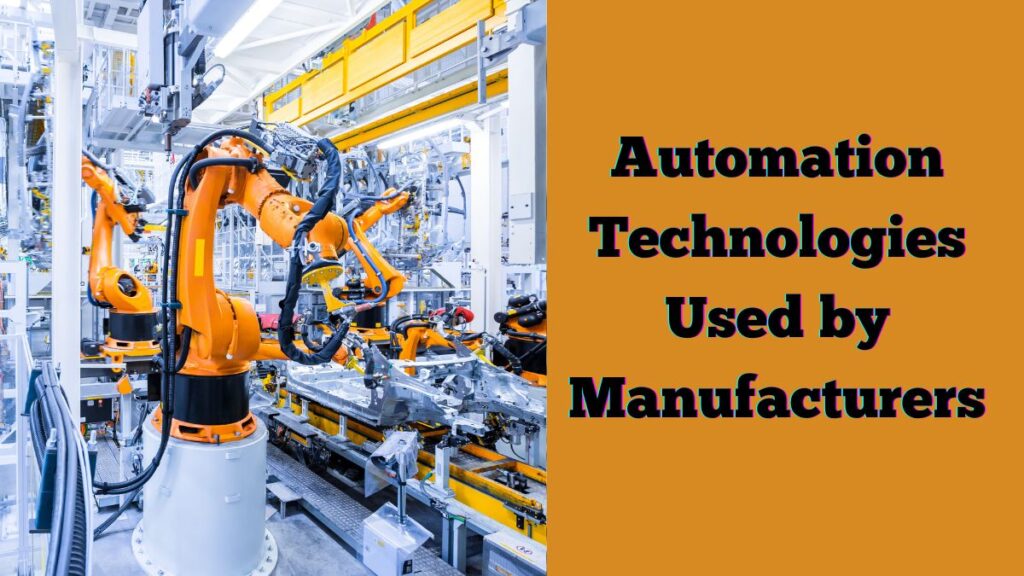Automation is the use of technology—including computers, robotics, and other machines—to reduce the need for manual labor. Automation can help manufacturers increase their production rates while requiring fewer workers, resulting in increased efficiency and cost savings.
What is Automation in The Manufacturing Industry?
Automation in the manufacturing industry is the use of technology—including computers, robots, and other machines—to reduce the need for manual labor. A variety of business tech tools and software is available that can help manufacturers increase their production rates while requiring fewer workers, resulting in increased efficiency and cost savings. Automation can also provide precise control over product quality and consistency, reducing waste and improving productivity. It also helps ensure compliance with safety regulations and standards.
Benefits of Automation Technologies in The Manufacturing Industry
Automation in the manufacturing industry offers a variety of benefits, including increased productivity and cost savings. Automation can help increase production rates while requiring fewer workers, resulting in increased efficiency and cost savings. Automation also provides precise control over product quality and consistency, reducing waste and improving productivity. Automation can also help ensure compliance with safety regulations and standards, improve customer satisfaction and reduce the risk of potential hazards. Additionally, automation helps keep costs down by reducing labor costs while improving accuracy and reliability.
Top 7 Automation Technologies in The Manufacturing Industry
Here are the 7 top automation technologies manufacturers use to stand out from the competition and increase their production rate immensely.
Enterprise Resource Planning (ERP)
Enterprise resource planning (ERP) systems are becoming increasingly popular in the manufacturing industry. By integrating data from all areas of a business, such as finance, inventory, and operations, manufacturers are able to track information better, enhance decision making and automate processes. ERP systems also provide real-time visibility into production scheduling, allowing companies to optimize their supply chain and reduce waste. In addition to the tangible benefits, ERP systems can help build long-term relationships between manufacturers and suppliers by providing secure and reliable access to data. As technology continues to evolve, ERP systems are becoming an integral part of any successful manufacturing operation.
Robotic Process Automation (RPA)
Robotic process automation (RPA) enables the automation of repetitive and mundane tasks in manufacturing, such as moving materials from one place to another. By automating these tasks using the right robots and solutions, manufacturers are able to save time and money, increase efficiency gains, reduce the potential for human error, and improve operational reliability. Additionally, RPA can improve safety in manufacturing by reducing the need for workers to enter hazardous areas or interact with dangerous machinery physically.
Internet of Things (IoT)
The Internet of Things (IoT) technology is transforming the way manufacturers do business. Manufacturers can create a digital ecosystem that allows for real-time data collection, analysis, and control by connecting machines, systems, and smart devices to the internet. This type of technology enables predictive maintenance, increased safety and quality control measures, streamlined production processes, and improved resource management. IoT also offers manufacturers unparalleled insights into customer preferences and trends that can be used to inform product design decisions. The impact of this technology on the manufacturing industry is undeniable—it is revolutionizing the way things are made and potentially unlocking a new era of efficiency.
Artificial Intelligence (AI)
Artificial intelligence (AI) is becoming increasingly important in manufacturing, as it enables manufacturers to automate labor-intensive tasks and optimize operations. AI can be used to identify patterns in production data and suggest areas for improvement, automate complex calculations to ensure quality control, provide predictive maintenance to prevent costly downtime, and streamline production processes for increased efficiency. By leveraging the power of AI, manufacturers can achieve higher levels of productivity and gain a competitive edge in the industry.
Machine Learning (ML)
Machine learning is a type of artificial intelligence that can be used to automate the gathering, processing, and analyzing of data in manufacturing operations. By automating these analytical functions, manufacturers can quickly identify areas for improvement, increase accuracy in decision-making, and reduce the need for manual labor. Additionally, machine learning can enable predictive maintenance to help identify potential issues before they occur in order to prevent costly downtime or repairs.

Additive Manufacturing
Additive manufacturing, also known as 3D printing, creates three-dimensional objects from a digital file. Additive manufacturing can be used to create objects with complex shapes that would be difficult or impossible to produce using traditional manufacturing techniques. This type of manufacturing utilizes layers of materials such as plastics, metals, and ceramics which are then joined together in order to form an object. Additive manufacturing has numerous applications in various industries, ranging from medical to aerospace.
Industry 4.0
Industry 4.0 is the latest revolution in the manufacturing industry, combining digital technologies such as artificial intelligence (AI), the Internet of Things (IoT), 3D printing, and cloud computing to create a smarter, more efficient production line. With Industry 4.0, manufacturers are able to reduce costs and maximize profits by automating tasks, streamlining processes and reducing waste. Additionally, it allows for predictive maintenance of machines and increased quality control measures that provide higher levels of product consistency. As technology continues to evolve and more manufacturers adopt Industry 4.0 processes, it is clear that this new manufacturing era will shape the industry’s future for years to come.
Conclusion
Manufacturing automation helps manufacturers optimize their operations by providing increased accuracy and speed in production. The use of automation also increases safety in the workplace by eliminating human error from manual processes. As technology continues to evolve, more manufacturers are adopting automation solutions to take advantage of its benefits and remain competitive in the ever-changing landscape of the manufacturing industry.


